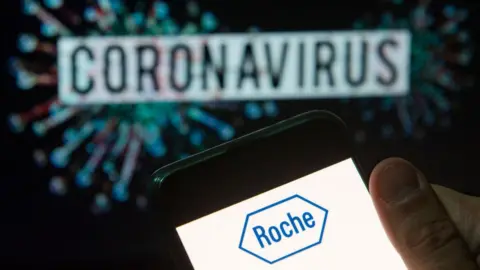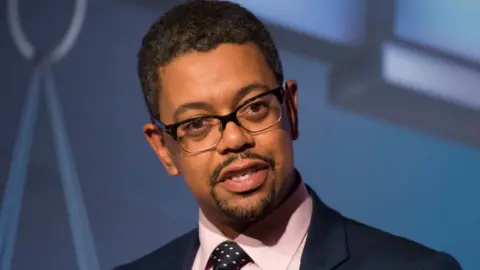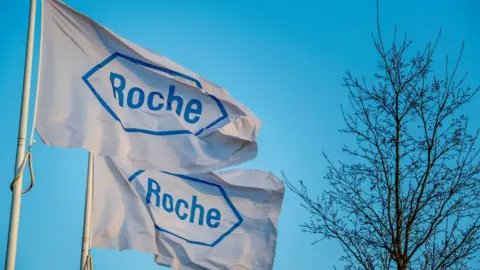Coronavirus: 'Collapsed' Roche testing deal correspondence withheld
 SOPA Images/Getty
SOPA Images/GettyWelsh ministers are refusing to publish correspondence with pharmaceutical firm Roche over an alleged Covid-19 testing deal which they say collapsed.
The Welsh Government said doing so "would be likely to prejudice relations with the UK government".
In March, the Welsh Government said it had agreed a deal with Roche to provide 5,000 extra tests-a-day. The Swiss firm denied that had been the case.
The Tories and Plaid Cymru are calling for the information to be released.
BBC Wales asked for the information in late March, with a Freedom of Information request.
On Saturday 21 March, Health Minister Vaughan Gething announced the Welsh Government would have access to 6,000 tests a day by 1 April and 8,000 tests a day within a week.
But those targets were revised in light of the Roche announcement, before the target of 9,000 tests a day by the end of April was scrapped completely.
Public Health Wales (PHW) later confirmed Wales was instead receiving 19% of Roche's UK allocation, or about 900 tests per day.
Wales only reached a capacity of more than 9,000 laboratory tests in the last week of May.
 Getty Images
Getty ImagesFollowing the announcement of the details about the Roche story, Mr Gething said there was "'no getting away" from the fact extra coronavirus tests "would have made an earlier difference".
He said at the time: "I recognise the interest the public, and in particular our front line workers, have in increasing our testing capacity sooner rather than later."
He added: "When all this is done, I'm sure there be lots of questions for all of us about choices we've made at various different points in time, including this particular aspect."
On 31 March, BBC Wales sent a request to the Welsh Government under the Freedom of Information Act (FOIA) for "all communication between Welsh Government and Roche about supply of coronavirus testing."
On 20 May, the Welsh Government announced an extension to the review process "due to the need to consider, in all the circumstances of the case, where the balance of the public interest lies in relation to the information that you have requested".
On 5 June, the government said it "does hold some correspondence that falls into scope" of the request.
But it said the release was exempt under the FOIA because it "is held for the purpose of formulation and development of government policy and disclosure of the information in question would, or would be likely to prejudice relations with the UK government".
 SOPA Images/Getty
SOPA Images/GettyPlaid Cymru has long called for the details of correspondence.
The party's leader Adam Price said it was "deeply disappointing that the Welsh Government has decided not to publish the correspondence between themselves and Roche - correspondence which would reveal exactly why the deal - which would have secured 5,000 daily Covid-19 tests for Wales, collapsed".
"Why then is the Welsh Government so ready to protect Westminster by choosing not to publish this correspondence when the collapse of the deal, and apparent gazumping, left Wales drastically wanting in terms of crucial Covid-19 testing capacity?" he said.
'Shocking'
Paul Davies, leader of the Conservatives in the Senedd, said: "The Welsh Government has already been asked questions regarding the name of the company involved, if there was an agreement or a contract and why the supply of tests collapsed and interestingly the Welsh Government responded by stating it 'does not hold' the information requested.
"It is, therefore, shocking that a similar request should receive a different response stating that the information can't be disclosed.
"The Welsh Government should now come clean about this matter and tell us whether it doesn't hold the information or whether it can't be disclosed. It cannot be both."
